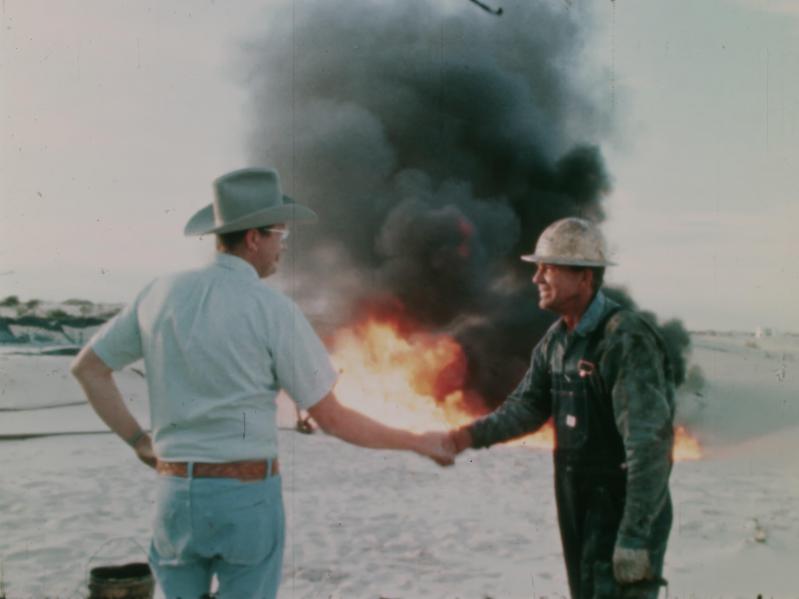During his 1988 run for the presidency, then-Vice President George H.W. Bush gave a speech in Michigan during which he unknowingly uttered a phrase that would go on to influence the rest of human history. He said, "For those of you worried about the greenhouse effect, you've forgotten about the White House effect."
A film of the same name, "The White House Effect," will be shown at the Hamptons International Film Festival next week. It is a film made up almost entirely of archival footage, mainly from the Bush Sr. administration. This era, 1988 to 1992, is unique as for the first time there was a president who understood climate change and publicly recognized it as an issue that needed to be addressed.
A window was opened, so what happened? What the film ultimately shows is how and why that window was slammed shut.
For younger generations, this film will be a wakeup call. For those who never learned about this time in environmental history, they will see it play out through astounding archival footage. And for those who wonder why we are where we are in the fight against climate change, it will be illuminating and at times infuriating.
According to the co-directors and producers, Bonni Cohen and Jon Shenk, that was the point. They spoke over Zoom on Monday about the four and a half years it took to put the film together, sifting through more than 15,000 clips of archival footage.
"The original intent was to gather the largest library that ever has existed around the climate crisis in all these different areas," Ms. Cohen said.
That idea changed over time, and the film came to be centered on the first Bush administration's rhetoric around climate change. "He was a pro-environment Republican candidate, which was like completely mind-blowing," Ms. Cohen said, "and the science was in and there was a drought in the country and it was this fulcrum moment where there was a little gap and the window was open."
What we know now is that there was a civil war within the Bush administration between Bill Reilly, an environmentalist Environmental Protection Agency director, and John Sununu, a former governor and the White House chief of staff who at every turn did his best to chip away at the administration's environmental positions.
Ms. Cohen and Mr. Shenk have worked on environmentalist-focused films before, such as "The Island President" (2011) and "An Inconvenient Sequel" (2017). They and a co-director, Pedro Kos, sought to make this one different in terms of how it affects the audience.
"We do mean this film to be a motivator," Mr. Shenk said. "I think a lot of climate films try to leave you with hope at the end, and I think our film is more of a mic drop, sort of a truth bomb about what happened, which is devastating and really sobering."
Mr. Kos was an editor on the film as well, working alongside Daniel Claridge and Sara Newens. They made it flow seamlessly, which along with music by Ariel Marx drives the viewer along the path of the country's downward environmental spiral.
The editors weave together decades of archival footage, jumping from the 1990s back to the 1970s to bring historical context to the climate crisis. The juxtaposition of President Jimmy Carter putting solar panels on the White House and President Ronald Reagan announcing deregulations for the coal industry is stunning.
The most intriguing part, however, is seeing how President Bush squandered the environmental good will he had, and in turn helped birth modern climate denialism. The power of the fossil fuel industry within the Bush administration is on full display.
"There was an opportunity there," Ms. Cohen said, "that was co-opted by the fossil fuel industry, and Bush comes out with that incredible statement that 'there are scientists on both sides.' "
Mr. Shenk believes that during that campaign speech in Michigan President Bush originally characterized "the White House effect" as a way for a president or administration to take action on issues for the public good. What this film shows is that original characterization was far from reality.
"Ironically I think the White House effect becomes really the lack of action on the most important issue that we face as a species," he said. "You can argue that his lack of action, that single decision, could prove to be the most important decision in the history of our species."
"The White House Effect" had its world premiere on Aug. 31 at the Telluride Film Festival. It will be screened at HIFF next Thursday at 5 p.m. and on Friday, Oct. 11, at 11 a.m. at the Regal movie theater in East Hampton.




